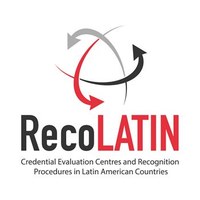
Sector: Modernisation of governance, management and functioning of higher education
Unibo structure involved: International Relations Division (DIRI)
Unibo Team: Romina Kniaz, Filippo Sartor
Website:
www.cimea.it/en/projects-ist/recolatin/recolatin-project.aspx
Project Duration in months: 36
Start Date: 15/10/2016
End Date: 14/10/2019
Budget: 904.850 euro
Unibo Budget: 60.188 euro
Coordinator: Conferenza dei Rettori delle Università Italiane (CRUI)
Partners:
- Centre International D'etudes Pedagogiques – Ciep (FR)
- Universite Paris Descartes (FR)
- Nasjonalt Organ For Kvalitet I Utdanningen Nokut Organisasjonsledd (NO)
- Universitetet I Stavanger (NO)
- Union De Universidades De America Latina Y El Caribe (MX)
- Universidad Nacional Autonoma De Mexico (MX)
- Universidad De Monterrey (MX)
- Ministerio De Educacion Panama (PA)
- Universidad De Panama (PA)
- Universidad Autonoma De Chiriqui (PA)
- Ministerio De Educacion Y Cultura Uruguay (UR)
- Universidad De La Republica (UR)
- Universidad Catolica Del Uruguay Damaso Antonio Larranaga Asociacion Civil (UR)
- Alma Mater Studiorum - Università di Bologna (IT)
- Associazione Cimea (IT)
- Secretaria De Educacion Publica Mexico (MX)
Description
The aim of RecoLATIN project is to favour and to increase the quality of vertical and horizontal student mobility within Latin America and European higher education systems. Partners intend to improve competencies and skills of credential evaluators by defining common practices and realising common tools among European and Latin America national bodies and HE institutions, starting from the experience of European HE institutions in relation with the Bologna Process and practices adopted by NARIC centres. Recognition procedures and practices are not only related to technical issues, but are influenced by the structure of each HE system and their cultural approach. The theme of recognition takes into account all the aspects of a HE system (i.e. QA; accreditation/recognition of institutions and programmes; access to courses; etc.): in order to evaluate a foreign qualification we need to know different elements and to consider the purpose of this evaluation procedure (i.e. academic or professional recognition). The activities of the project are placed both at national (official bodies) and institutional level (HEIs). The Latin America countries signed the UNESCO Recognition Convention in 1974 and their recognition practices are based on previous concepts not influenced by the Lisbon Recognition Convention criteria. For that reason we intend to create operational national recognition centres and to provide training activities on recognition practices for their staff. We will draft National Reports of each partner country involved in the project in order to present their HE systems in the view of recognition purposes. We will focus our attention on controversial recognition cases and sectors as TNE and international institutions, distant learning qualifications and non-traditional degrees. Each result of the project will be disseminated through two final seminars organised in the two respective areas as an impulse for both other countries and their HE institutions.

